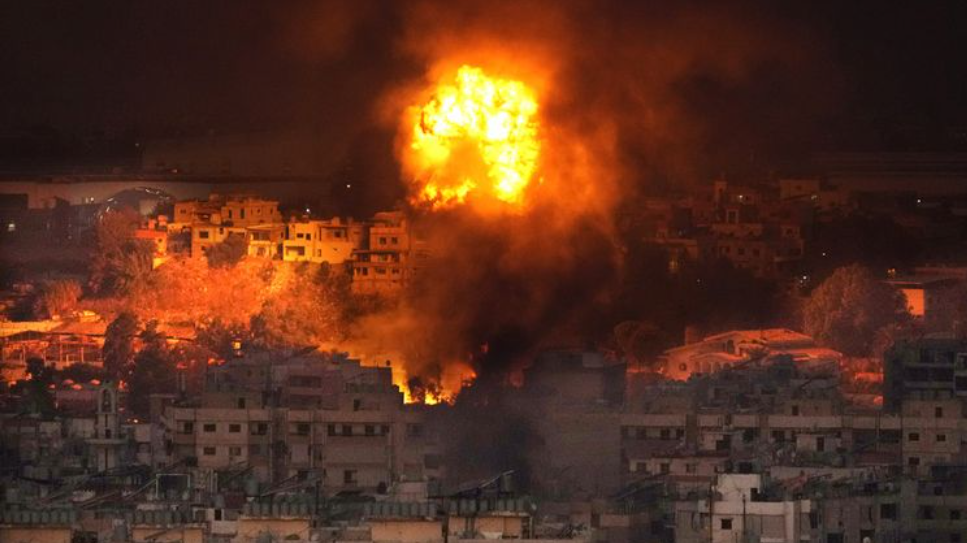Hezbollah Leader Hassan Nasrallah Killed, Lebanon Invaded, and Israel Attacked as Middle East Conflict Intensifies

Image courtesy of 9News
By Joey Broom
The pager and walkie-talkie explosions were merely the beginning. Since the attacks on September 17th and 18th, Israel has been conducting daily airstrikes throughout Lebanon in an effort to decimate the leadership and military capabilities of the Shia Islamist organization Hezbollah. Over the past two weeks, Israel has destroyed a significant portion of Hezbollah’s weapons stockpile and eliminated many senior commanders.
But perhaps the biggest blow came on September 27th, when Israel conducted a massive airstrike that demolished Hezbollah’s headquarters in Beirut and killed Hassan Nasrallah, the cleric who has led the organization since 1992. Killing Nasrallah has long been a goal of Israel.
Nasrallah was a polarizing figure. In the Middle East, he was once considered a hero for his role in ending the two-decade Israeli occupation of Lebanon. However, he became the subject of intense criticism across the region after Hezbollah provoked a war with Israel in 2006 and for supporting the Assad regime in Syria. Hezbollah is currently highly unpopular in Lebanon, with support limited to southern Shi’ite communities that rely on its economic and social services.
In the Western world, Nasrallah was reviled as a terrorist, homophobe, and antisemite responsible for the deaths of thousands. His leadership resulted in Hezbollah’s designation as a terrorist organization by the U.S., Israel, and many other countries, as well as the Arab League and the European Union.
Born in 1960, Nasrallah joined Hezbollah (Arabic for “Party of God”) around the time of its formation in the 1980s to fight Israel’s invasion and occupation of southern Lebanon. He became Hezbollah’s leader after Israel killed his predecessor, Abbas al-Musawi, in an airstrike. Hezbollah began to dominate Lebanese politics as it sought to emulate the theocratic governance of Iran, to whom the organization pledged allegiance.
Under Nasrallah, Hezbollah became one of the world’s largest non-state militias, its capabilities surpassing that of the Lebanese Armed Forces. Hezbollah engaged in a protracted armed conflict with Israel, whose destruction the organization considers its ultimate goal. It carried out bombings against the U.S. and Israel across the globe, such as in Argentina, Bulgaria, and Panama. It forged alliances with numerous countries that oppose the U.S. and Israel, including Cuba, North Korea, Russia, and Syria, as well as non-state militias such as the Palestinian Hamas and the Russian Wagner Group.
The U.S. endorsed the killing of Nasrallah. President Joe Biden called the airstrike “a measure of justice for his many victims, including thousands of Americans, Israelis, and Lebanese civilians.” His death was also celebrated in rebel-controlled areas of Syria. Other countries called for Israel and Hezbollah to de-escalate, and some condemned Nasrallah’s killing as escalatory and a violation of Lebanese sovereignty.
While the long-term consequences that Nasrallah’s death will have on Hezbollah remain unclear, it is a humiliating security breach that demonstrates the level to which Israel has infiltrated the organization’s ranks. It also represents a serious blow to Iran, which has heavily relied on Hezbollah to exert its influence across the Middle East.
On October 1st, Israel launched a limited invasion of Lebanon aimed at further crippling Hezbollah. Iran retaliated by launching a major missile attack against Israel that night, while seven were killed in a mass shooting in Tel Aviv. As the one-year anniversary of the October 7th attacks approaches, the Iran–Israel proxy conflict seems closer than ever to escalating to a full-scale war.






